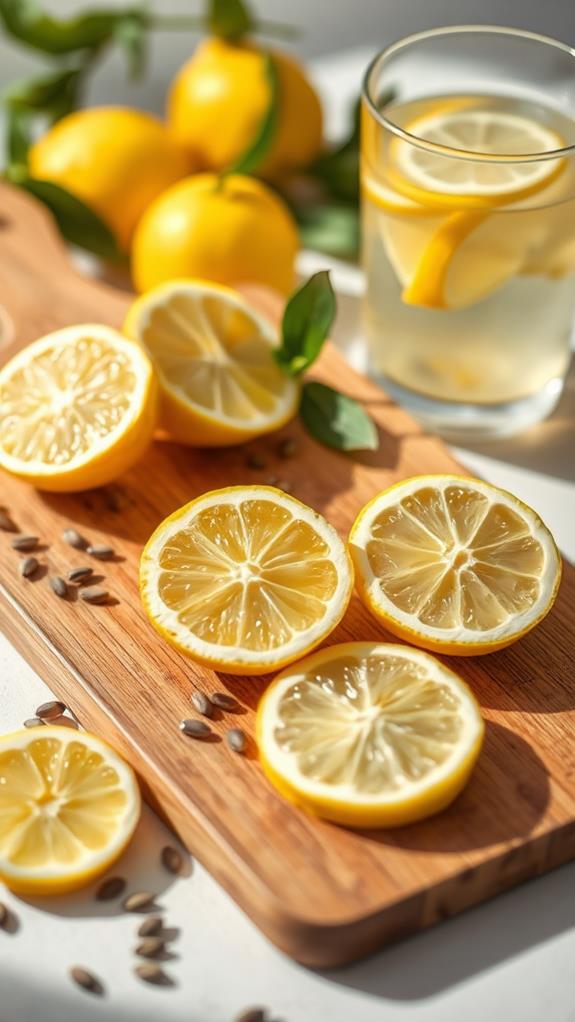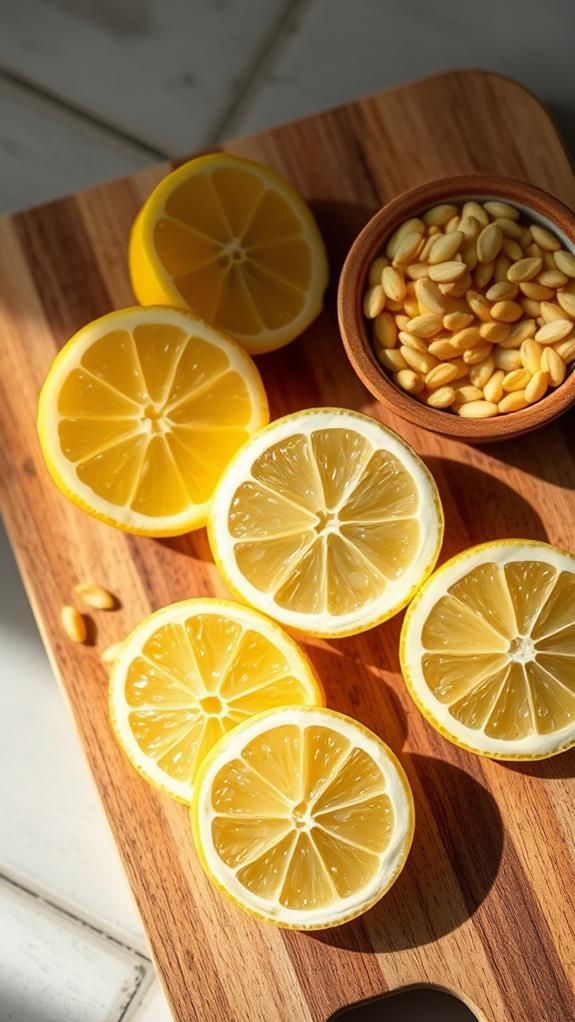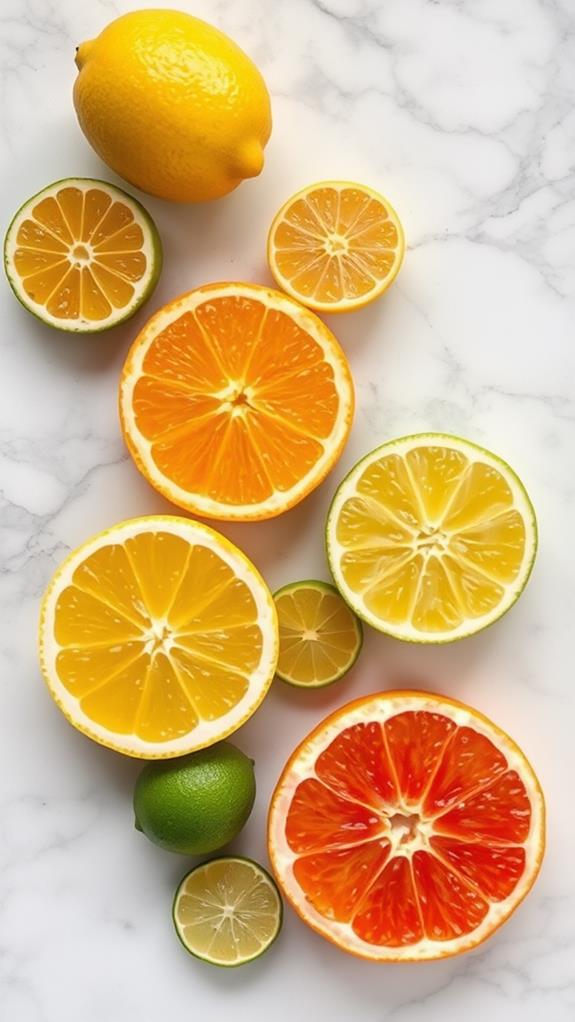Is It Safe to Eat Lemon Seeds
Lemon seeds are generally safe to eat in small quantities, but they're not particularly nutritious. While they contain some fiber, antioxidants, and essential oils, their tough outer coating makes them difficult to digest. You might experience mild stomach discomfort if you consume too many. The seeds pose a potential choking hazard, especially for children. They also contain trace amounts of compounds that can release cyanide, but the quantity is too small to be harmful. If you're juicing lemons, it's best to strain out the seeds. While not dangerous, there's little benefit to eating lemon seeds regularly. Further exploration reveals surprising culinary uses and potential health benefits of these often-discarded citrus byproducts.
This post may contain affiliate links. If you make a purchase through these links, I may earn a commission at no additional cost to you. Additionally, portions of this post may be generated using artificial intelligence (AI) technology. While we strive for accuracy, please be aware that AI-generated content may not always be perfect and should be fact-checked when necessary.
The Spatula Scoops
- Lemon seeds are generally safe to consume in small quantities and are not toxic.
- Eating large amounts of lemon seeds may cause digestive discomfort due to salicylic acid and limonin content.
- Lemon seeds pose a potential choking hazard, especially for children or individuals with swallowing difficulties.
- Whole lemon seeds typically pass through the digestive system intact, offering minimal nutritional value.
- Removing lemon seeds before consumption is recommended to improve taste and texture in recipes.
Lemon Seed Composition

Lemon seeds contain several key components that contribute to their nutritional profile and potential health effects. You'll find that these small, often overlooked parts of the fruit are packed with nutrients and bioactive compounds. The seeds are rich in fiber, which aids digestion and promotes gut health. They also contain essential oils, primarily limonene, which gives lemons their characteristic scent and flavor. Similar to salmon skin benefits, lemon seeds offer a range of nutrients that can support overall health when consumed in moderation.
In addition to these components, lemon seeds are a source of antioxidants, including flavonoids and phenolic compounds. These antioxidants help protect your cells from oxidative stress and may have anti-inflammatory properties. You'll also find small amounts of vitamins and minerals in lemon seeds, such as vitamin C and potassium.
Notably, lemon seeds contain small amounts of salicylic acid and a compound called limonin. Limonin is responsible for the bitter taste you might experience if you accidentally bite into a seed. While these compounds aren't typically harmful in small quantities, they can cause digestive discomfort if consumed in large amounts. That's why you'll often see recommendations to remove seeds before juicing or eating lemons.
Nutritional Value
While the composition of lemon seeds offers insight into their potential benefits, understanding their nutritional value provides a clearer picture of how they might contribute to your diet. Lemon seeds contain small amounts of essential nutrients, including fiber, protein, and healthy fats. They're also a source of antioxidants, particularly flavonoids and limonoids, which may have anti-inflammatory properties. Similar to organic cacao butter, lemon seeds are low in calories and carbohydrates, making them suitable for various dietary needs.
You'll find trace amounts of vitamins and minerals in lemon seeds, such as vitamin C, calcium, and potassium. However, the quantities are relatively low compared to other parts of the lemon or alternative food sources. It's worth noting that the nutritional content can vary depending on factors like seed size and maturity.
While lemon seeds do offer some nutritional value, they're not typically consumed in large quantities due to their bitter taste and potential digestive discomfort. As a result, their overall contribution to your daily nutrient intake is likely to be minimal. If you're looking to boost your nutrient intake, you'd be better off focusing on more substantial food sources or consuming the lemon's flesh and juice, which provide higher concentrations of beneficial compounds.
Potential Health Benefits

Over the years, researchers have uncovered several potential health benefits associated with lemon seeds. You'll find that these tiny seeds contain compounds that may offer various advantages for your health. They're rich in antioxidants, which can help protect your cells from damage caused by free radicals. These antioxidants might play a role in reducing inflammation and supporting your immune system. Like unique hollow crystals found in some salts, lemon seeds have a distinctive structure that contributes to their properties.
Lemon seeds also contain salicylic acid, a compound known for its pain-relieving properties. This natural substance may help alleviate minor aches and pains when consumed in small amounts. Additionally, the seeds are a source of fiber, which can aid in digestion and promote feelings of fullness.
Some studies suggest that lemon seeds might have antimicrobial properties, potentially helping to fight off harmful bacteria in your body. They're also believed to contain small amounts of pectin, a type of soluble fiber that may support heart health by helping to lower cholesterol levels. Crucially, more research is needed to fully understand the effects of consuming lemon seeds regularly.
Risks and Side Effects
While lemon seeds aren't typically dangerous, you should be aware of a few risks. They can cause digestive discomfort if consumed in large quantities, and they contain a compound that breaks down into cyanide, though the amount is generally too small to be harmful. Perhaps the most immediate concern is that lemon seeds pose a potential choking hazard, especially for children or if swallowed whole.
Potential Digestive Discomfort
Consuming lemon seeds can lead to digestive discomfort in some people. While generally safe in small amounts, ingesting larger quantities may cause issues. You might experience symptoms like stomach upset, nausea, or mild abdominal pain. These effects are often due to the seeds' fibrous nature and the presence of compounds like limonene.
Here's a breakdown of potential digestive discomfort:
| Symptom | Severity | Duration |
|---|---|---|
| Stomach upset | Mild to moderate | 1-3 hours |
| Nausea | Mild | 30 min – 2 hours |
| Abdominal pain | Mild | 1-4 hours |
| Bloating | Mild to moderate | 2-6 hours |
It is crucial to recognize that while uncomfortable, these symptoms are usually temporary and not severe. However, if you experience persistent or severe discomfort after eating lemon seeds, it's best to consult a healthcare professional. They can provide personalized advice and rule out any underlying conditions that might be exacerbating your symptoms.
Cyanide Compound Concerns
Rumors about cyanide in lemon seeds often spark concern among health-conscious individuals. You might have heard that these seeds contain dangerous levels of cyanide compounds, but it is crucial to understand the facts. While lemon seeds do contain small amounts of amygdalin, a substance that can release cyanide when metabolized, the quantity is minimal and unlikely to cause harm.
To put your mind at ease, consider these points:
- Amygdalin content in lemon seeds is considerably lower than in other fruit seeds, like apple or cherry pits.
- Your body can safely process small amounts of cyanide compounds.
- You'd need to consume an unrealistically large quantity of lemon seeds to experience any toxic effects.
The cyanide concerns surrounding lemon seeds are largely exaggerated. Your digestive system is well-equipped to handle the trace amounts present in a few accidentally swallowed seeds. However, if you're particularly worried, you can simply spit out or avoid consuming the seeds altogether. Remember, the flesh and juice of lemons offer numerous health benefits, so don't let unfounded fears prevent you from enjoying this citrus fruit in moderation.
Choking Hazard Risk
Occasionally, the real risk associated with lemon seeds isn't their chemical composition but their physical properties. As small, hard objects, lemon seeds can pose a choking hazard, especially for children or individuals with swallowing difficulties. While adults are less likely to choke on these seeds, it's still a possibility you should be aware of.
When you're consuming lemons or lemon-based products, it's important to be mindful of the seeds' presence. They're often easily visible and can be removed before eating or juicing. However, in some cases, such as when drinking lemonade or eating lemon-flavored desserts, you might not notice the seeds until they're in your mouth.
If you accidentally swallow a lemon seed, don't panic. Your digestive system can usually handle it without issues. However, to minimize risks, it's best to remove seeds when possible. When preparing lemon-based recipes, consider using a fine-mesh strainer or cheesecloth to filter out seeds. This practice not only reduces choking risks but also improves the texture and consistency of your culinary creations. Remember, while lemon seeds aren't inherently dangerous, it's always better to err on the side of caution.
Digestibility of Lemon Seeds

Lemon seeds pose a challenge for your digestive system. Unlike the soft, easily digestible flesh of the fruit, these seeds have a tough outer coating that's resistant to your stomach acids. When you swallow lemon seeds whole, they'll likely pass through your digestive tract intact, offering little nutritional value.
Your body's ability to break down lemon seeds depends on several factors:
- Chewing: If you thoroughly chew the seeds, you'll increase their digestibility.
- Stomach acid strength: Stronger stomach acid may partially break down the seed coat.
- Individual digestive efficiency: Some people's systems may process seeds more effectively than others.
While your body can handle occasional ingestion of lemon seeds, regularly consuming large quantities isn't advisable. The seeds contain small amounts of compounds like limonene and salicylic acid, which can be beneficial in small doses but may cause digestive discomfort in larger amounts. If you're concerned about seed consumption, you can opt for seedless lemon varieties or strain your lemon juice before use. This practice aligns with content optimization strategies, ensuring a smoother user experience – a key factor in SEO performance.
Common Myths Debunked
When it comes to lemon seeds, you'll find a plethora of myths circulating online and in conversations. Let's debunk some of these common misconceptions to help you understand the truth about consuming lemon seeds.
First, you might've heard that lemon seeds are toxic. This isn't true. While they contain small amounts of salicylic acid, it's not enough to cause harm when consumed in normal quantities. Another myth suggests that lemon seeds can grow in your stomach. Rest assured, your stomach acid will break down the seeds long before they could germinate.
Some believe lemon seeds have miraculous health benefits, claiming they cure cancer or aid in weight loss. However, there's no scientific evidence supporting these assertions. While lemon seeds do contain some nutrients, they're not a superfood.
You may have also encountered the idea that swallowing lemon seeds causes appendicitis. This is unfounded; there's no correlation between seed consumption and appendix inflammation. Ultimately, contrary to popular belief, lemon seeds aren't inherently bitter. Their taste can vary, but they're generally mild and sometimes slightly nutty.
Culinary Uses

Chefs and home cooks alike have found creative ways to incorporate lemon seeds into their culinary repertoire. You might be surprised to learn that these often-discarded bits can add a unique flavor and texture to your dishes. When ground, lemon seeds impart a subtle bitterness that can enhance the complexity of sauces, dressings, and marinades. You'll find that they pair particularly well with seafood and poultry dishes.
To use lemon seeds in your cooking, consider these options:
- Grind them into a fine powder and use as a seasoning
- Infuse oils or vinegars with whole seeds for added depth
- Incorporate them into baked goods for a zesty crunch
When experimenting with lemon seeds, remember that a little goes a long way. Their intense flavor can quickly overpower other ingredients if you're not careful. It's best to start with small amounts and adjust to taste. As you become more comfortable using lemon seeds, you'll discover they're an excellent way to reduce food waste while adding a distinctive touch to your culinary creations. By embracing this often-overlooked ingredient, you're not only expanding your culinary horizons but also practicing sustainable cooking.
Lemon Seed Oil
You might be surprised to learn that lemon seeds can be used to produce a valuable oil. Lemon seed oil is extracted through cold-pressing or solvent extraction methods, resulting in a nutrient-rich product containing vitamins, minerals, and beneficial fatty acids. This versatile oil finds its way into both culinary applications, where it adds a subtle citrus flavor to dishes, and cosmetic products, thanks to its potential skin-nourishing properties.
Extraction and Production Methods
For the production of lemon seed oil, several extraction methods are available. You'll find that cold pressing is a common technique, where seeds are mechanically pressed to release their oil without the use of heat or chemicals. This method preserves the oil's natural properties and nutritional value.
Another popular method is solvent extraction, which uses chemical solvents like hexane to separate the oil from the seeds. While this process is efficient, it may leave trace amounts of chemicals in the final product. You should be aware that some manufacturers opt for supercritical CO2 extraction, a more environmentally friendly technique that uses pressurized carbon dioxide to extract the oil.
When considering lemon seed oil production, keep these key points in mind:
- Quality of seeds impacts the final product
- Extraction method affects oil purity and composition
- Processing temperature can influence oil properties
The choice of extraction method often depends on factors such as cost-effectiveness, desired oil quality, and intended use. As a consumer, you might want to research the extraction method used for any lemon seed oil product you're interested in purchasing, as it can affect the oil's overall quality and potential health benefits.
Nutritional Value and Benefits
While extraction methods are important, the nutritional value and benefits of lemon seed oil are equally remarkable. You'll find that this oil is packed with essential fatty acids, particularly omega-3 and omega-6. These healthy fats play a pivotal role in supporting heart health, reducing inflammation, and promoting brain function.
Lemon seed oil is also rich in antioxidants, including flavonoids and limonoids. These compounds help protect your cells from oxidative stress and may have potential anti-cancer properties. Additionally, you'll benefit from the oil's high vitamin C content, which supports your immune system and aids in collagen production for healthy skin.
The oil contains d-limonene, a terpene known for its potential anti-inflammatory and anti-cancer effects. You might also appreciate its antimicrobial properties, which can help fight off harmful bacteria and fungi. When incorporated into your diet or skincare routine, lemon seed oil may contribute to improved digestion, enhanced skin health, and even stress reduction. It is essential to understand that more research is needed to fully comprehend and confirm these potential benefits.
Culinary and Cosmetic Uses
Lemon seed oil frequently finds its way into both culinary and cosmetic applications due to its versatile nature. You'll find it used in various dishes, adding a subtle citrus flavor and aroma to salad dressings, marinades, and baked goods. In the cosmetic industry, it's prized for its potential skin-nourishing properties and is often incorporated into lotions, serums, and hair care products.
When using lemon seed oil in cooking, remember that a little goes a long way. Its concentrated flavor can easily overpower other ingredients if used excessively. In cosmetics, it's typically blended with carrier oils or other ingredients to create effective skincare formulations.
High in antioxidants, which may help protect skin from free radical damage. Contains antimicrobial properties, potentially useful in natural preservatives. Rich in vitamin C, supporting collagen production and skin health.
Whether you're experimenting with new recipes or crafting homemade skincare products, lemon seed oil can be a valuable addition to your toolkit. However, always use it in moderation and perform a patch test before applying it to your skin to verify you don't have any adverse reactions.
Comparison With Other Citrus Seeds

Compared to other citrus seeds, lemon seeds aren't unique in their edibility. You'll find that most citrus seeds share similar characteristics, including those from oranges, grapefruits, and limes. Like lemon seeds, these seeds contain small amounts of compounds that can be bitter or potentially harmful in large quantities.
When comparing citrus seeds, you'll notice they all have a tough outer coating and a soft interior. This structure is consistent across the citrus family. However, there are slight variations in size and bitterness levels. For instance, grapefruit seeds tend to be larger and more bitter than lemon seeds, while lime seeds are often smaller.
The nutritional content of citrus seeds is relatively similar, with most containing small amounts of fiber, protein, and essential oils. These oils, which give citrus fruits their distinct flavors and aromas, are present in higher concentrations in the seeds and peels. It's worth noting that while citrus seeds are generally safe to consume in small quantities, they're not typically considered a significant source of nutrients in most diets.
Precautions and Recommendations
How can you safely consume lemon seeds while minimizing potential risks? While lemon seeds aren't typically harmful in small quantities, it's best to exercise caution. If you're considering eating lemon seeds, start by thoroughly washing the lemon to remove any pesticides or contaminants. When consuming the seeds, chew them well to aid digestion and prevent choking hazards. It's imperative to listen to your body and stop if you experience any discomfort.
To guarantee safe consumption of lemon seeds, consider these precautions:
- Limit intake: Don't consume large quantities of lemon seeds, as they contain small amounts of compounds that can be harmful in excess.
- Avoid if pregnant or nursing: Pregnant or breastfeeding women should consult their healthcare provider before consuming lemon seeds.
- Be aware of allergies: If you have citrus allergies, avoid lemon seeds altogether.
If you're interested in the potential benefits of lemon seeds, consider alternatives like lemon zest or juice. These options provide similar nutritional value without the risks associated with seed consumption. Remember, while lemon seeds aren't typically dangerous, moderation is key. Always prioritize your health and consult a medical professional if you have concerns about incorporating lemon seeds into your diet.
Frequently Asked Questions
Can Lemon Seeds Be Used for Growing Lemon Trees at Home?
Yes, you can use lemon seeds to grow lemon trees at home. It's a simple process that requires patience. First, clean the seeds and plant them in well-draining soil. Keep the soil moist and warm, ideally between 70-80°F. Germination typically takes 1-2 weeks. Once seedlings appear, provide plenty of sunlight and regular watering. Remember, trees grown from seeds may not produce fruit identical to the parent lemon, and it can take several years before your tree bears fruit.
Are There Any Cultural or Traditional Uses for Lemon Seeds?
You may be surprised to learn that lemon seeds have some cultural and traditional uses. In Ayurvedic medicine, they're believed to have detoxifying properties. Some folk remedies suggest using ground lemon seeds as a natural pest repellent. In certain cultures, lemon seeds are used in teas or infusions for their potential health benefits. However, it is crucial to acknowledge that these uses aren't scientifically proven, and you should always consult a healthcare professional before trying any new remedies.
How Long Can Lemon Seeds Be Stored Before They Lose Viability?
You can store lemon seeds for quite a while if you handle them properly. Typically, they'll remain viable for up to three years when kept in a cool, dry place. To maximize their longevity, you'll want to clean and dry the seeds thoroughly before storage. It's best to keep them in an airtight container in your refrigerator. Remember, even with ideal storage conditions, germination rates may decrease over time, so it's advisable to plant them within the first year for the best results.
Do Different Lemon Varieties Have Seeds With Different Properties or Flavors?
You might think all lemon seeds are created equal, but that's not the case. Different lemon varieties can indeed have seeds with varying properties and flavors. While you won't find any lemon seeds tasting like a smartphone, they do differ in bitterness, size, and oil content. Meyer lemons, for instance, tend to have sweeter, less bitter seeds compared to Eureka lemons. The seed's flavor can also be influenced by the lemon's growing conditions and ripeness.
Can Lemon Seeds Be Used in Natural Beauty or Skincare Treatments?
You can incorporate lemon seeds into natural beauty and skincare treatments. They're rich in antioxidants and vitamin C, which can benefit your skin. You might grind them into a fine powder and mix with honey for a gentle exfoliating scrub. Some people add crushed seeds to facial masks for potential anti-aging effects. However, it's important to patch test first, as lemon seeds can cause irritation for some. Always consult a dermatologist before trying new skincare ingredients.
Conclusion
You've peeled back the layers of lemon seed safety, and now you're armed with the juicy details. While these tiny seeds aren't toxic, they're not exactly a culinary delight either. Like a tart surprise in your lemonade, they're best avoided for comfort's sake. If you do swallow a few, don't panic—your body will likely pass them without incident. Remember, when life gives you lemons, enjoy the fruit but don't make a meal of the seeds.





